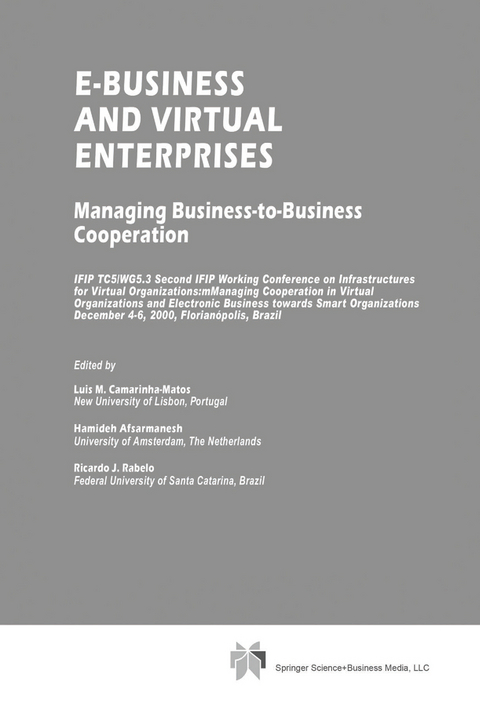
E-Business and Virtual Enterprises
Springer-Verlag New York Inc.
978-1-4757-5045-4 (ISBN)
1: New Organizational Models.- 1. Will the Organisation Disappear? the Challenges of the New Economy and Future Perspectives.- 2. A New Paradigm for the Next Century: the Task Oriented Job Market.- 3. E-Diagnosis: Knowledge Management and Organizational Change in Virtual Times.- 4. A Diary Using Fuzzy Sets.- 2: Infrastructure Requirements.- 5. Infrastructure for the Advanced Virtual Enterprise: A Report Using a Brazilian-Based Example.- 6. Linking Smes’ Clusters: A View of the Information Infrastructure.- 7. Working Efficiently with the Service Industries.- 8. VE Infrastructures Requirements for Cooperation and Knowledge Sharing.- 3: Infrastructures Development.- 9. Supporting Agility in Virtual Enterprises.- 10. The Sace-Cscw Framework: An Infrastructure to Support Virtual Enterprises and Concurrent Engineering Processes.- 11. Design of a Computer-Supported Cooperative Environment for Small and Medium Enterprises.- 12. Environment for Design and Analysis of System Integration.- 4: Multi-Agent Based Collaboration.- 13. Requirements for an Agent Based Information System Supporting Variably Coupled Networked Enterprises.- 14. Federated Multi-Agent Scheduling in Virtual Enterprises.- 15. The Netman Agent-Based Architecture for E-Business in Network Organizations.- 16. A Mobile-Agent Based Architecture for Virtual Enterprises.- 5: Information Management and Coordination.- 17. Supporting Information Access Rights and Visibility Levels in virtual Enterprises.- 18. A Virtual Project House Infrastructure for Distributed Development Processes.- 19. The holonic Paradigm as a New Metaphor for the Coordination problem of Virtual Enterprises.- 20. Protocol-Based Cooperation in a Virtual Manufacturing Organization.- 6: Supply Chain Management.- 21. Agent-Based Infrastructure ofSupply Chain Network Management.- 22. A Distributed Framework for Collaborative Supply Network Integration.- 23. New tools for Multi-Stage Supply Chains.- 24. Supply Chain Management and Distributed Manufacturing in the Automotive Industry.- 7: Industry Clusters and Brokerage.- 25. Action Research: The Formation of a Manufacturing Virtual Industry Cluster.- 26. Exploitation of Business Opportunities: The Role of the Virtual Enterprise Broker.- 27. Agent-Based Brokerage for Virtual Enterprise Creation in the Moulds Industry.- 8: E-Commerce and Logistics.- 28. Logistics Support to Electronic Commerce in Brazil: Trends and Constraints.- 29. A Survey on the Use of E-Commerce by Brazilian Companies.- 30. Electronic Commerce with XML/EDI in Virtual Enterprises.- 9: Distributed Production Planning.- 31. The Price-Date-Relationship as a Negotiating Tool in Production Planning and Control.- 32. Production Planning and Control Information System for the Engineering AND Make to Order Environment.- 33. The Design and Development of a Discrete Event Simulation System to Support Virtual Industry Activities.- 34. Process Support for Virtual Projects in the Construction Sector.- 10: Knowledge Management.- 35. Cognet: Integrated Information and Knowledge Management and Its Use in Virtual Organisations.- 36. An IT-Based Framework for Knowledge Management in Networked Organisations.- 37. Shop Floor Reengineering to Support Agility in Virtual Enterprise Environments.- 38. A Conceptual Framework for Aggregate Management of Virtual Enterprises.- 11: Socio-Organizational Issues.- 39. Virtual Organizations and the Cultural Dimension: Organization Rites in the Consolidation of Telework.- 40. Virtual Teams and The Organisational Grapevine.- 41. “Moral Infrastructure” and VirtualEnterprises: Ethics as a Competitive Factor for the Internet Commerce in Brazil.- 42. Informal Networks: Managing the Knowledge Within Virtual Enterprises.- 12: Skills and Value Assessment.- 43. A Methodology to Evaluate Enterprises to Become Members of Virtual Industry Clusters.- 44. An Assessment Model to Analyze Organizational Readiness to Implement Telework Arrangements.- 45. A Systematic Approach to IPR Definition in Cooperative Projects.- 13: Quality Management.- 46. Quality Certification in the Virtual Enterprise: An Objective Tool for Supply Chain Management and Customer Satisfaction.- 47. An Innovation Coaching Approach to Efficiently Introduce QM-Systems in Smes.- 48. Using Knowledge Management to Improve Quality.- 14: Product Development.- 49. A Combined Knowledge and Information Infrastructure to Support Product Development.- 50. Towards a Virtual Organization: The Rapid Prototyping Portuguese National Network.- 51. iPDM Systems.- Author Index.
| Reihe/Serie | IFIP International Federation for Information Processing ; 56 |
|---|---|
| Zusatzinfo | XVIII, 534 p. |
| Verlagsort | New York, NY |
| Sprache | englisch |
| Maße | 155 x 235 mm |
| Themenwelt | Mathematik / Informatik ► Informatik ► Datenbanken |
| Informatik ► Office Programme ► Outlook | |
| Informatik ► Software Entwicklung ► User Interfaces (HCI) | |
| Mathematik / Informatik ► Informatik ► Theorie / Studium | |
| Wirtschaft ► Betriebswirtschaft / Management ► Marketing / Vertrieb | |
| Wirtschaft ► Betriebswirtschaft / Management ► Unternehmensführung / Management | |
| ISBN-10 | 1-4757-5045-5 / 1475750455 |
| ISBN-13 | 978-1-4757-5045-4 / 9781475750454 |
| Zustand | Neuware |
| Informationen gemäß Produktsicherheitsverordnung (GPSR) | |
| Haben Sie eine Frage zum Produkt? |
aus dem Bereich


